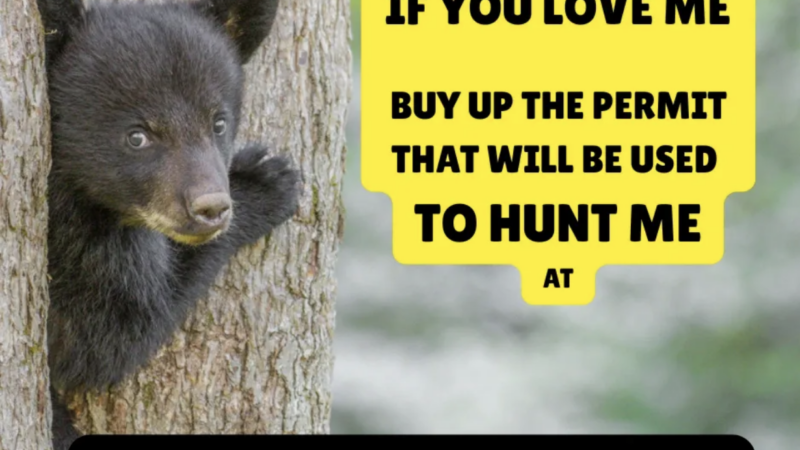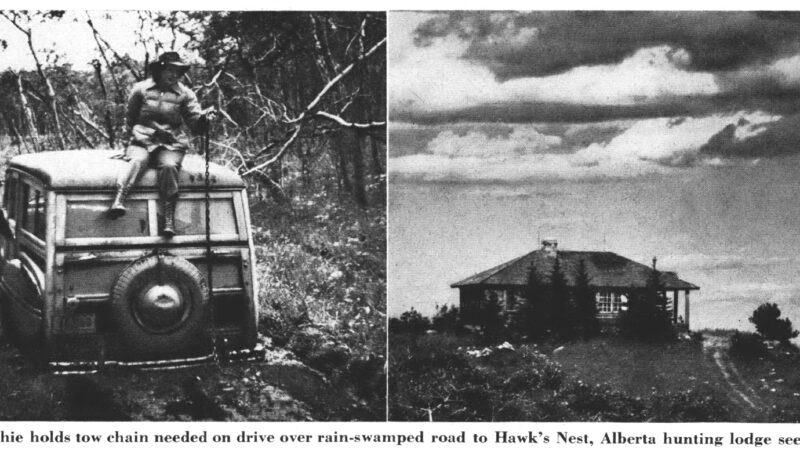After a Failed Compromise, Virginia Landowners Will Now Push for a Full Ban on Deer Hunting with Hounds
Last week the Virginia Board of Wildlife Resources voted against adopting two proposed regulations for hunters who use dogs to hunt big game. One Department of Wildlife Resources reg would have mandated the use of GPS tracking collars for all deer and bear dogs. The other would have required hunters to make a “reasonable effort” to prevent their dogs from entering a landowner’s property after receiving notice that they’re not welcome.
This is the latest development in a decades-long culture clash in Virginia, where deer hunting with hounds is a rich tradition. During Virginia’s 2023 to 24 firearms season, 50 percent of deer were harvested with the aid of dogs. (The practice remains legal in just eight states, all Southern; the last state to ban it was Texas, in 1990.)
Virginia houndsmen say the proposed regulations that didn’t pass last week were onerous and poorly written, and indeed the majority of public comments overwhelmingly opposed both measures. The Virginia Hunting Dog Alliance contends that a small group of unethical houndsmen and tetchy out-of-state transplants are giving the sport a bad rap. The best solution, argues VAHDA CEO and lobbyist Kirby Burch, is to ramp up training and enforcement by the conservation police force, which is understaffed.
Private property owners say the unwillingness of Virginia hound hunters (as houndsmen are called there) to compromise is “maddening.” Other states have more regulations in place for hunters who run hounds, which range from permits to GPS requirements. The only recourse that remains, says Virginia Property Rights Alliance spokesman and hunter Chris Patton, is for property-rights advocates to abandon compromise efforts, too.
“Until this decision by the DWR to not regulate [hunting deer and bear with dogs], we have always been of the mind that the way to save hound hunting in Virginia was to regulate it in a way that protects property rights and enables this tradition to continue,” says Patton. “But with the hound lobby refusing even the most mild regulation and the DWR abandoning landowners by failing to regulate hound hunting at all, we’re left with no other option than to call for a complete ban on hunting deer and bear with hounds. It’s sad that it has to come to this.”
What Houndsmen Say
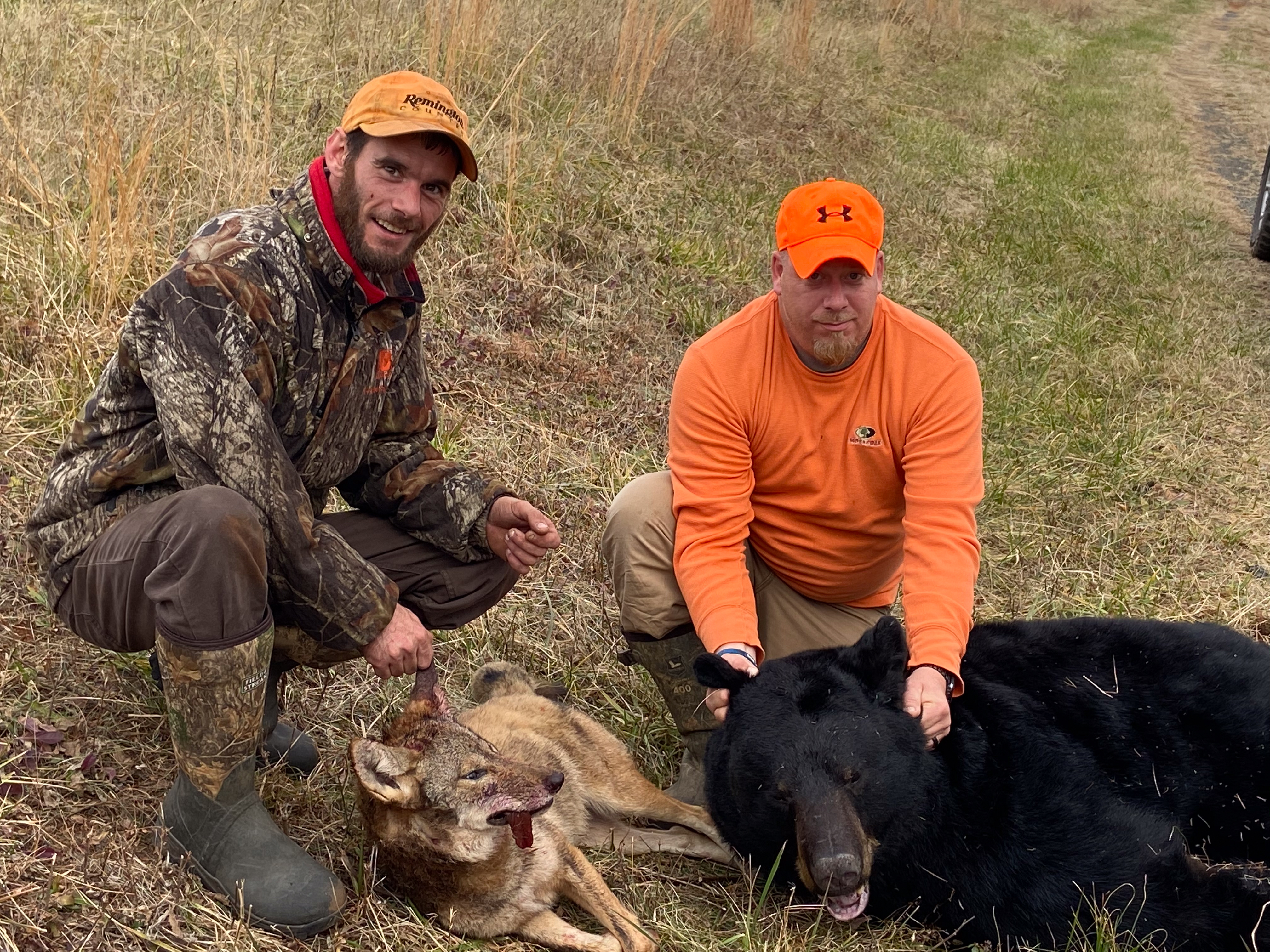
Photo courtesy of Andrew Pullen
At 37, Virginia hunter Andrew Pullen has run hunting dogs for deer, bear, turkey, and coyotes all his life. Pullen says he’s never had a complaint against himself and his dogs or a conflict with neighboring property owners until last season. That’s when a man trespassed onto the parcel he was hunting, Pullen says, and grabbed his German shorthaired pointer by the collar.
“He walked right into the middle of the [deer] drive and grabbed my dog and drug it away from me,” says Pullen, who is the volunteer fire chief where he lives in Kents Store, and a fire captain in Spotsylvania County. “I chased him down and confronted him, and he basically said, ‘You’re going to fight me or shoot me but you’re not getting your dog.’ I said, ‘You’re trespassing,’ and he said, ‘I’m sick of dog hunting.’ He was so fired up about dog hunting that he was willing to trespass and steal from me.”
Ultimately Pullen had the advantage with strength in numbers and was able to call a conservation officer, but the would-be thief wasn’t charged with trespassing. Instead, Pullen says the game warden sent both parties on their way.
“I said, ‘Hey man, this is why we [hunters] get a bad rap. We have 15 witnesses and evidence [from my GPS track], charge this SOB.’ I was pretty frustrated about that,” says Pullen. “But I respect law enforcement and shook my head and walked away.
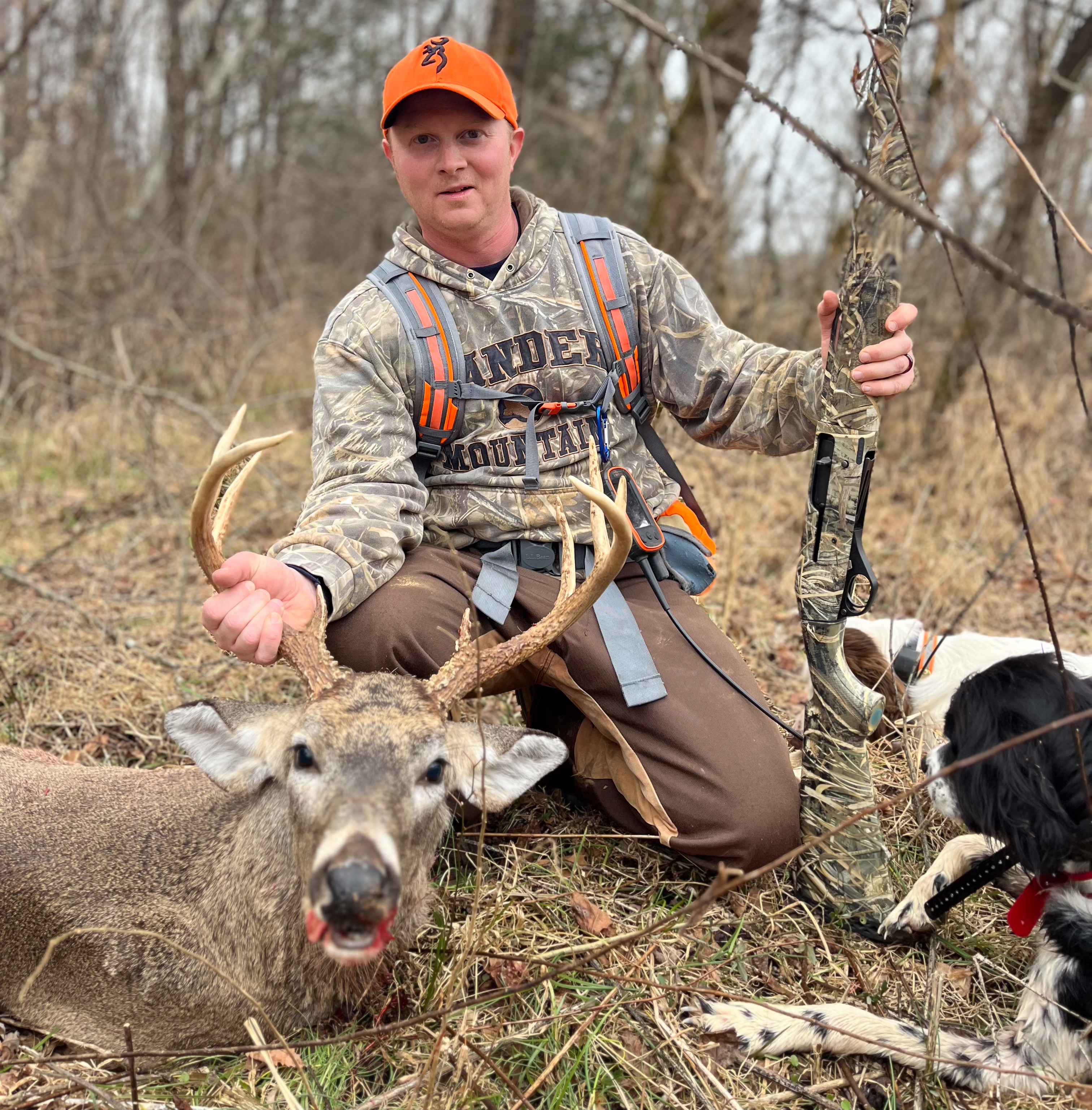
Photo courtesy of Andrew Pullen
“We live in a small town that people up North recognize they want to retire to. They come here, and buy their little farmettes, and they get pissed off about our way of life. You bought five acres in the middle of hundreds of acres of timber property and you see an occasional dog and you’re raising hell. I get that, but also it’s the South … I love hunting with my dogs and I’ve gone above and beyond to be a respectful houndsmen. … Most hunters [who run dogs] are like me.”
Although Pullen grew up with beagles and hounds, he started breeding Llewellin setters for running game like bear, deer, coyotes, and turkey because, in part, he found they’re attentive at checking in with their handler. Unlike hounds, which are bred to range for miles, his setters and pointers return after a few hundred yards. That’s one reason Pullen gets calls from buddies all over the region who love to hunt with his dogs.
“Around here if you’ve got a Boone and Crockett deer you want to [kill] during deer season, you call me,” says Pullen. “Because I can control those dogs [especially on smaller tracts like 15 acres].”
Read Next: Are Deer Dogs Really a Problem for Deer Hunting in the South?
Every year, Pullen and his dogs get an invite to join firemen, state troopers, and other first responders to deer hunt a huge chunk of timber company land. They usually shoot 15 to 20 does, cook a big dinner, and make a day of it. So last year, Pullen released his GPS-collared dogs on that property where they had permission to hunt. He could hear them barking on a track and monitored them on his Garmin GPS tracker.
“I let them run within a couple hundred feet of the property line. They stopped barking, so they’d ended the chase anyway, and I toned them to come on back to me. I kept walking and all the other dogs came to check in except for one. And I thought, man, where’s Tip at?”
Pullen’s Garmin screen showed his best dog, a 4-year-old brown and white Llewellin, wandering aimlessly nearby. Then his buddy spotted Tip in a creek.
“I set my shotgun down and ran up to him. He just looked sick,” says Pullen. “I couldn’t figure it out. I laid him down and rubbed him head to toe, and found one little spot of blood. I lifted his hair up and found an entrance wound. I flipped him over and found the exact size exit wound. I picked him up on my shoulders and ran out of there.”
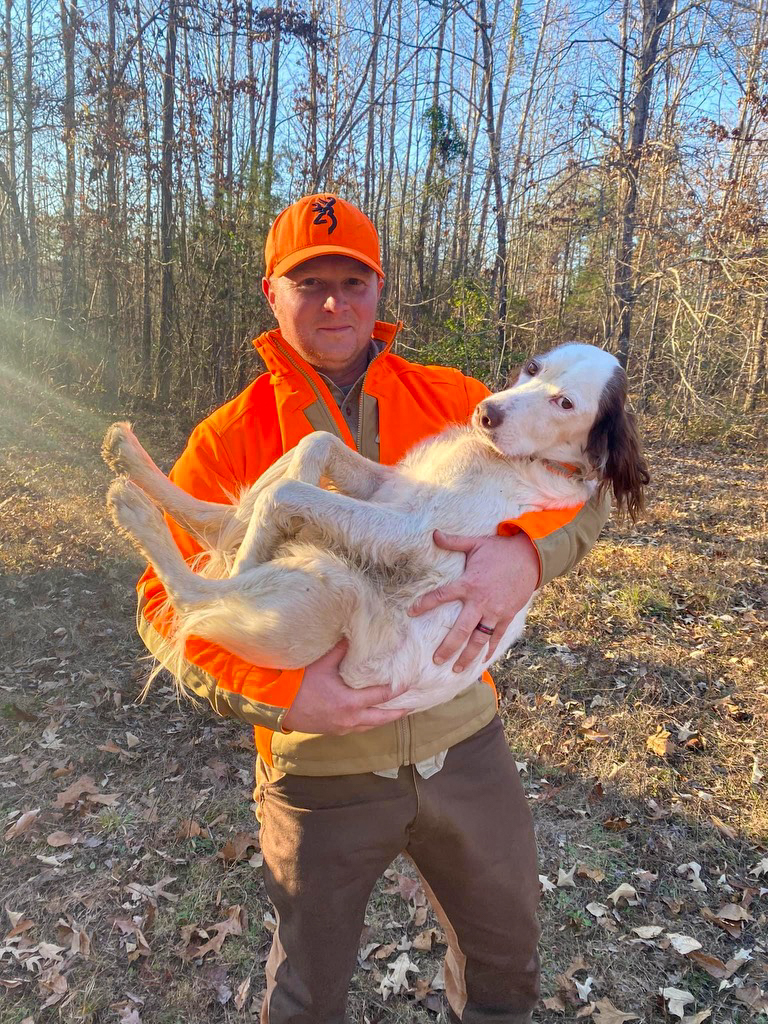
Photo courtesy of Andrew Pullen
Pullen spent about $10,000 at the vet trying to save Tip from what he suspects was an air rifle pellet. Pullen’s group never heard a gunshot and he says his dogs never crossed a property line according to his Garmin track. Tip’s death was, as Pullen puts it, “financially and emotionally devastating” to his family. The man who Pullen says shot his dog was never charged. He has threatened other hunters and is part of a militant community that discusses shooting and burying hunting dogs on social media. One man in that community, who Pullen says lives on his road, patrols his road frontage with a rifle and body camera, waiting for a dog hunting the adjacent leased property to stray onto his.
The day before his dog was shot, Pullen says a photo someone had taken of him in his truck appeared on Facebook with the caption, “Game on, more to come.”
What Landowners Say
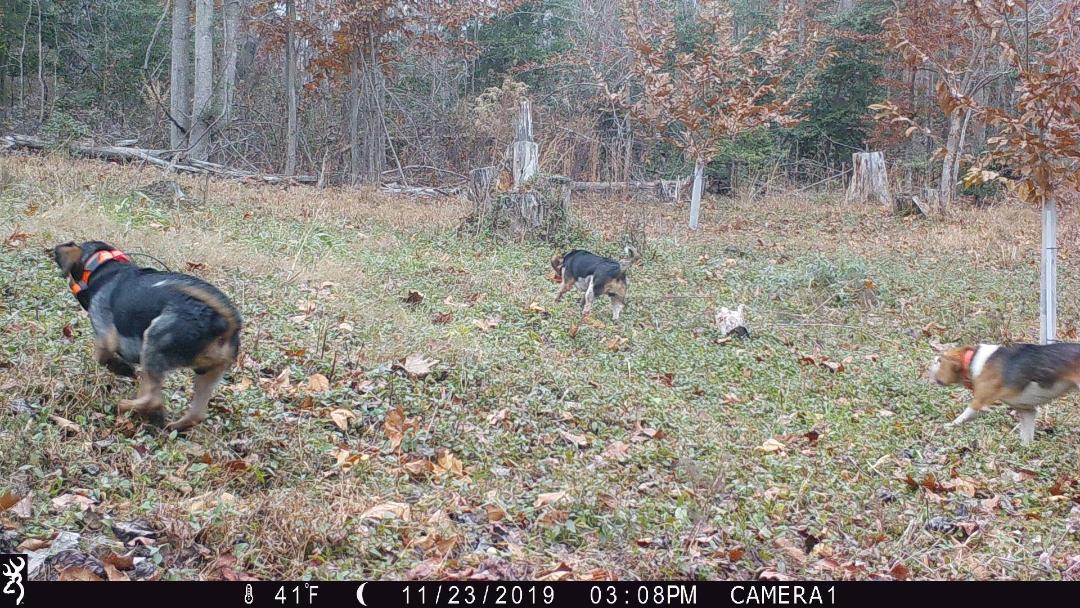
Photo courtesy of Virginia Property Rights Alliance
A few years ago, Chris Patton, now 54, retired from the Marine Corps. After serving nearly 30 years, most recently in the Pentagon, he decided to make Virginia his home. He purchased 160 acres in Nottoway County in 2021, which turned out to be adjacent to one of the thousands of hunt clubs in the state. It was after he met his neighbor that he ended up getting involved with the Virginia Property Rights Alliance.
“Soon after closing, the next door neighbor came over and introduced himself and said, ‘Hey I run the local hunt club here and you’re going to see our dogs on your farm.’ Not a ‘Would you mind if we run our dogs on your farm, it’s been something we’ve been doing for a long time,’ or ‘Would you entertain a lease or permission?’”
The situation has escalated to the point that Patton says hunters deliberately release their dogs adjacent to his property (which is legal) and on the public road in front of his property, and cast their hounds onto his land.
“At least once a week, sometimes several times a week, I get collared hunting dogs running through my property,” says Patton, who notes that the firearms season runs through mid-November to early January. “Last deer season I had 25 different occasions where collared hunting dogs were running through my farm. So absolutely every Saturday morning, every Sunday morning, usually Friday afternoons — so anytime a normal guy like me is going to be hunting, you’ve got hounds running through your farm chasing the deer off.”
A bowhunter, muzzleloader, and occasional rifle hunter, Patton has also been working to improve the habitat on his property. That includes bedding areas for whitetails, brooding cover for wild turkeys, and quail habitat. Because many houndsmen in the area run their dogs year-round (it’s legal to hunt coyotes and foxes with hounds 365 days a year in Virginia), he says dogs are still disturbing all the wildlife on his property.
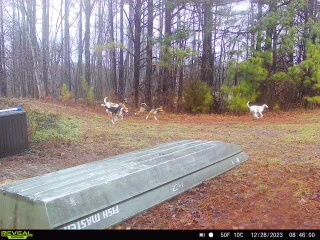
Photo courtesy of Chris Patton
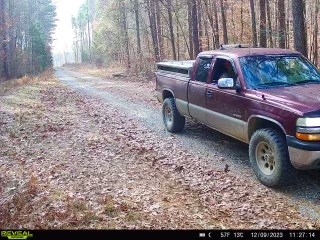
Photo courtesy of Chris Patton
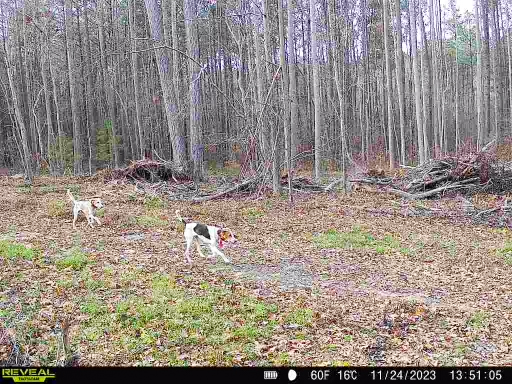
Photo courtesy of Chris Patton
“It’s unbelievably maddening to see a hound dog trotting across your field with a dead fawn in its mouth,” says Patton. “I’m not describing things that are outlawed. All of this is completely legal in Virginia. You have absolutely no control over your own property.”
Patton likes dogs. He grew up hunting quail over Brittanies and has owned dogs all his life.
“There’s no anti-hunting thing here. I don’t care at all that someone uses a dog to hunt deer with. I don’t personally hunt that way because I don’t enjoy it, but I have no problem with it. They just have to do it on a place where they have permission. That’s the entirety of the discussion. Do it where you have permission. Contain your dogs to lands where you have permission. If they would do that, we would have absolutely no problem.”
The issue, Pattons says, is essentially a Constitutional one. He cites the last line of the Fifth Amendment, which reads that “private property [shall not] be taken for public use, without just compensation.”
“I think the only way forward for Virginia is to ban hound hunting altogether,” says Patton, who is clear that he doesn’t have an issue with horse-back mounted fox hunters. “They banned [hunting with hounds in other states] because of this. Because the hound hunters were so overt in their trespassing and people got so sick of it, and there was no willingness to compromise, that they said, ‘Alright screw it. We can’t do this anymore. Property rights are more important than some man’s hobby.’ Which is exactly what hunting is, it’s a hobby.”
Public Support for Deer Dogs, by the Numbers
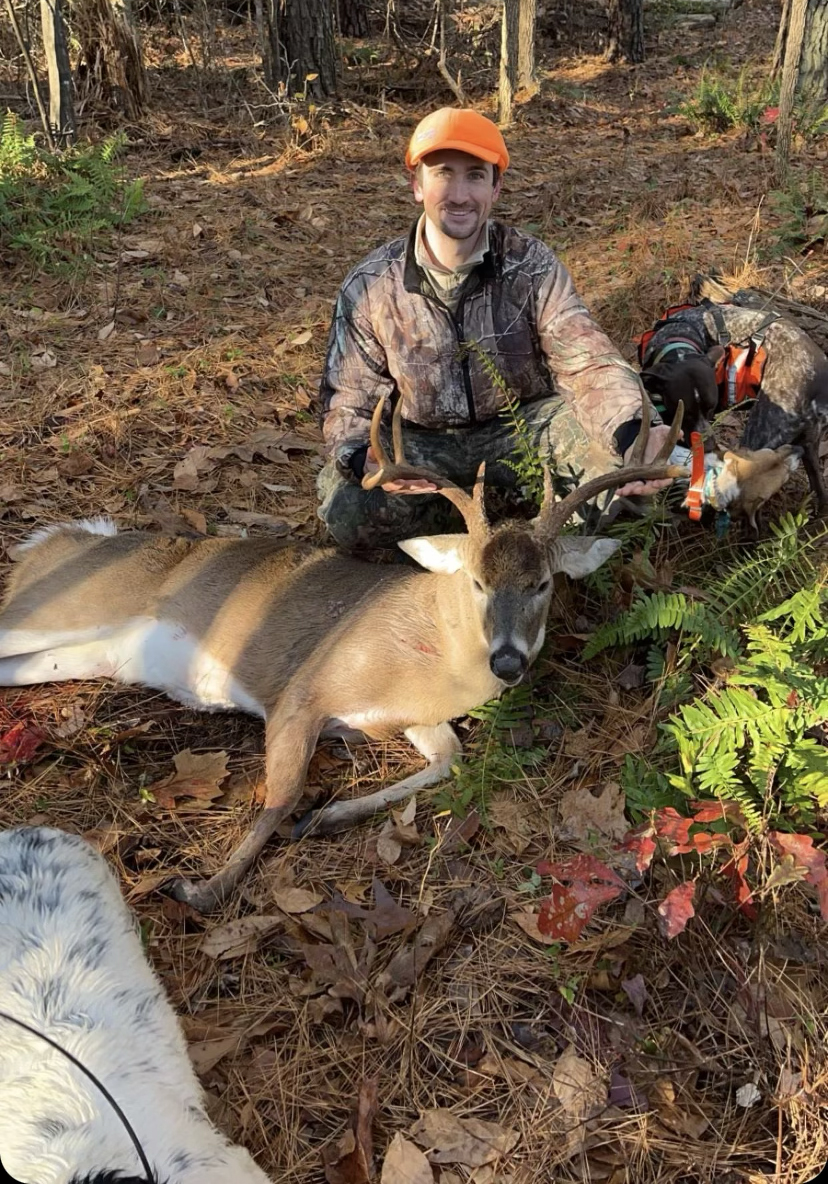
Photo courtesy of Andrew Pullen
Burch, the CEO of the Virginia Hunting Dog Alliance, points to the high public opposition to the two regulations that did not pass. Following the public comment period this spring, 61 percent of commenters opposed the proposed GPS collar mandate for tracking dogs while just 25 percent supported it (the remaining comments were neutral or unrelated).
“The hound community agrees that about 99 percent of all hunters now use GPS collars,” says Burch. “So it was not in opposition to having them. The opposition came because they’re not a perfect answer to anything, as anyone who uses them regularly knows. You can often have a dog gone for 15 or 20 minutes, and that could be 3 miles before the collar updates. The transmission’s not good, you get all kinds of different problems, and they’re expensive … which can prevent new hunters from entering the sport.”
The lack of support for the “reasonable effort” clause was even higher, with 80 percent of commenters opposing it and about 12 percent supporting it. The main opposition to the proposal was that it wasn’t enforceable and wouldn’t prevent hunting dogs on private property.
“The regulation they wrote had lots of faults. There were lots of people on both sides that didn’t like it. When I first saw it, I about lost my mind,” says Patton. “But at its core, it required dog hunters to make reasonable efforts to keep their dogs off posted private property once they’ve been notified they aren’t supposed to be there. That is the lowest possible bar of common sense that we could impose and enforce. If their dog is on private property and the landowner tells that dog owner ‘I do not want your dogs on my property,’ then he would just have to make an effort to keep the dogs off. And he would essentially get three strikes because the first time you notify, then he gets a second strike, and the third time is the time he could get a misdemeanor charge. I don’t know any other law where you get to break it three times and it’s only wrong on the third time. The other thing, it’s washed clean every year. So every season, you [would get] three more strikes. It wasn’t a great proposal, but at its core it was good in that it at least would’ve set the bar for compliance.”
Burch says there would have been too much onus on an honest hunting dog handler, who could end up being charged with a crime.
“There are legitimate complaints, as there are in any human endeavor. But we believe the overwhelming majority of hound hunters are both ethical and legal, and work hard to be good neighbors,” says Burch.
He also points to the extremely low rate of game law violations by houndsmen as evidence that just a few vocal landowners have problems with hunting dogs. VAHDA tracks hunting violations and complaints from 2013 through 2022.
“There were 6,000 wildlife violations between January 2022 and January 2023 in Virginia. Of all the summonses issued, only 2.8 percent were issued related to hunting with dogs,” says Burch. “We make up a little more than 60 percent of the hunting population, people who hunt with dogs. And these statistics reflect bird dogs, waterfowl dogs, and retrievers going on somebody’s lease to retrieve a duck.”
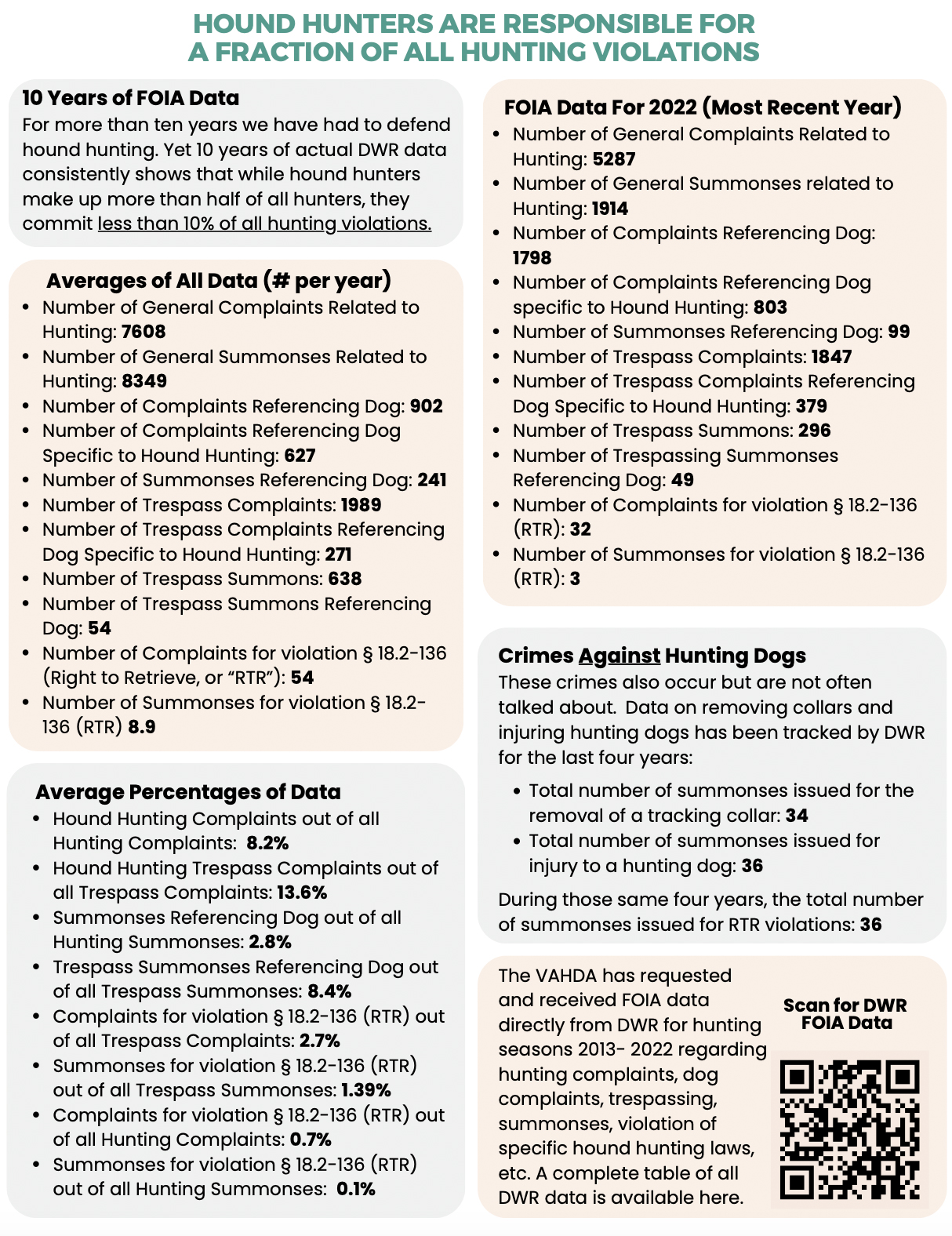
Courtesy of VAHDA
Patton says this percentage is so low because most of his problems with hound hunting stem from legal behavior, and the few laws that are on the books are essentially unenforceable. For instance, it’s illegal to deliberately cast your dogs on private property where you don’t have permission. But that’s nearly impossible to enforce, says Patton, because often hunters can say they’re simply retrieving their dogs, which is legal.
“No matter how many game wardens we have, all the game wardens can do is stand there and admire the problem and say, ‘Mr. Patton, I understand what is happening here is wrong, but there is no regulation or law that I can enforce to stop them.’”
Pullen has also taken issue with the way some regulations have been written, and while he’s willing to compromise, he doesn’t want to agree with a regulation that’s not practical.
“I understand 100 percent where Chris [Patton] is coming from,” says Pullen, who sees Patton’s dispute as a beef between neighbors. “In Chris’ case it’s not incidental, they’re doing it on purpose. And obviously the dogs are the tool of people who keep screwing with Chris. If I had people every Tuesday night turning their foxhounds loose on my property I’d be fighting mad too … I have witnessed dog hunters pull up to somebody’s property that they don’t have permission to be on and throw their dogs over a fence. I’ve seen it. And I’ve told the landowner, ‘I’ve got them, call the game warden.’ Game warden gets there and he says, ‘I didn’t witness it, I need you to go to the magistrate and we’ll sort out the warrants.’ And what does the property owner say? ‘I don’t want to go to the trouble, I called you to do it.’ … There are idiots who have dogs. But I don’t want hunting with dogs taken from me.”
Pullen, Patton, and Burch all served on the Virginia DWR’s Hound-Hunters and Private Landowners Stakeholder Advisory Committee, and are familiar with each other’s positions. (You can read their final report here.) The Virginia DWR did not respond to a request for comment on this story.
Read Next: CJ Alexander Pleads Guilty to 14 Charges Related to Poaching Giant Ohio Buck
As the spokesman for the VPRA, Patton isn’t inclined to tip his hand about what the next steps toward a ban on hunting with hounds looks like, but he says there’s recourse in all three branches of government. He also expects a lawsuit over the legality of the right to retrieve to resurface. Last month, in a lawsuit brought by a dairy farmer who has been vocal about property rights, the state supreme court upheld hunters’ Right to Retrieve their dogs over a technicality related to the lack of a court transcript.
In the meantime, hunting dog advocates will continue to work toward solutions that are community-based rather than regulatory.
“I believe if the VDWR will get serious about working with these committees in areas where there are differences between neighbors, between hunters and non-hunters, between types of hunters, I believe we can basically deal with this for another generation,” says Burch, 77, who worries about additional red tape, expense, and the changing landscape of hunting with hounds as parcels get smaller and access vanishes. “People laugh at me. Oh you’re going out of business in five years. I’ve heard that since 1990. It takes a willingness on the part of a sportsman to get involved and not leave it to other people.”
The post After a Failed Compromise, Virginia Landowners Will Now Push for a Full Ban on Deer Hunting with Hounds appeared first on Outdoor Life.
Source: https://www.outdoorlife.com/hunting/deer-hunting-hounds-regulations-virginia/


